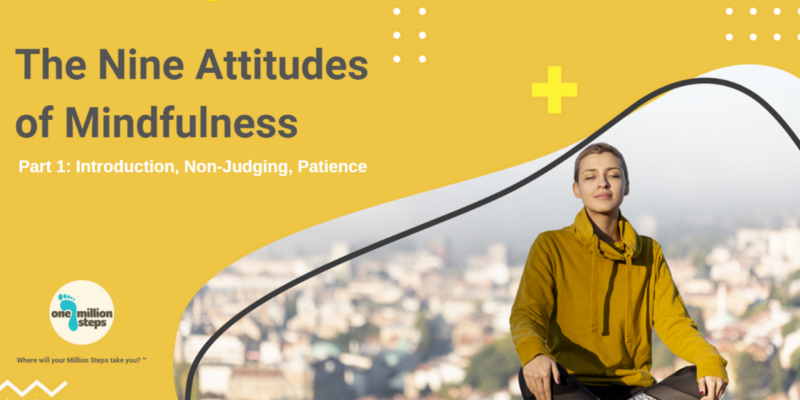
Part 1: Introduction, Non-Judging, Patience
In our first article Introduction to Mindfulness, we set the scene by saying that mindfulness is not meditation. And that meditation is just a small part of living mindfully.
But that meditation as a practice is a really important tool, a tool that can help us focus on living a mindful life. And that the key element of focus, is awareness.
You may have already noticed that we really harped on about awareness.
Awareness. Awareness. Awareness. Awareness. Awareness. Awareness. Awareness. Awareness. Awareness. Awareness. Awareness. Awareness. Awareness. Awareness. Awareness. Awareness. Awareness. Awareness.
So we hope you get the hint. Because from this moment on, we are going to talk about the world outside of meditation.
Your world. And how you live in it.
Or rather, how you choose to live in it. Because we all have a choice. To live it aware. Or not.
Because “Like it or not, this moment is all we really have to work with.” Jon Kabat-Zinn
It’s not easy to be aware all of the time. But if you can try your best. Then you will begin to understand what living a mindful life is, and the role of meditation in it.
To do that, we have to understand the Nine Attitudes of Mindfulness as defined by Jon Kabat-Zinn in his book Full Catastrophe Living.
“Mindfulness is awareness that arises through paying attention, on purpose, in the present moment, non-judgementally,” says Kabat-Zinn. “And then I sometimes add, in the service of self-understanding and wisdom.” Source
Jon Kabat-Zinn acknowledges that being aware is one of the most difficult things we as human beings can do. But there are principles.
And the quote above is not just some random statement. It has been structured with fine detail and key points.
Mindfulness is a unique form of awareness that comes from paying attention
It is done on purpose. This indicates that we have willed it. We have chosen to do it.
And this awareness is in the present moment. Our awareness should not be clouded by a memory or a fear of the future. It is an awareness at this very moment.
And it should be non-judgemental. It is what it is. We do not attach an opinion or feeling toward it.
Each time we are able to have a level of awareness that is mindful, we begin to free ourselves from our sometimes irrational actions. Or rather actions influenced by our past experiences or fears of a yet unreached future.
This gives us clarity, and with clarity, we see different options and may make wiser decisions and take better actions.
For the work on the Nine Attitudes of Mindfulness, I am immensely grateful for the video interviews with Jon Kabat-Zinn by Minds Unlimited, based in Sweden. They are a truly invaluable resource and insight into what defines the idea of mindfulness.
We want you to have a deep dive into these Attitudes, so we will split this into a set of three articles. Take the time to explore further resources on the Attitudes of Mindfulness where you can. They really are the key to living a mindful life with meditation as the tool to help you keep your focus.
Introduction: The 9 Attitudes of Mindfulness
“There is no Enlightenment outside of daily life” Thich Nhat Hanh
Jon Kabat-Zinn was influenced by the thoughts and teachings of Thich Nhat Hanh, a Vietnamese Thien Buddhist monk, peace activist, and founder of the Plum Village Tradition.
That one quote says everything about life, learning, awareness and a mindful existence.
Non-Judging: The 9 Attitudes of Mindfulness
Be an impartial witness to every moment and experience.
As an example, let’s say you are practising watching your breathing. At a certain point, you may find your mind saying something like, “This is boring,” or “This isn’t working,” or “I can’t do this.” These are judgments. When they come up in your mind, it is very important to recognize them as judgmental thinking and remind yourself that the practice involves suspending judgment and just watching whatever comes up, including your own judging thoughts, without pursuing them or acting on them in any way. Then proceed with watching your breathing. Jon Kabat-Zinn Source Google Books
Patience: : The 9 Attitudes of Mindfulness
“The wisdom of patience is something that is profoundly healing and restorative”
Patience is a form of wisdom. It demonstrates that we understand and accept the fact that sometimes things must unfold in their own time. A child may try to help a butterfly to emerge by breaking open its chrysalis. Usually, the butterfly doesn’t benefit from this. Any adult knows that the butterfly can only emerge in its own time, that the process cannot be hurried. Jon Kabat-Zinn Source Google Books
To find out more about the Million Steps Challenge and how we can help you, your business or charity, please visit https://millionsteps.com
Or Register your organisation interest: Million Steps CoVid-19 Package here
